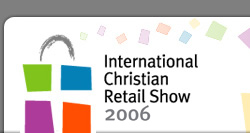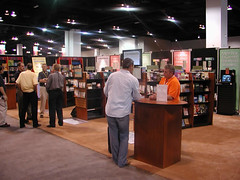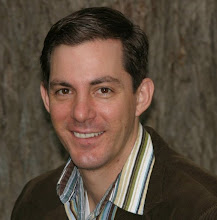Thursday, July 27, 2006
Turning Tables but not Cheeks: History of the CBA
 The LA Times recently ripped the International Christian Retailers Show (ICRS) in Denver in their article "Christian Retailers Put Their Print on Products." This is part one of a four part series discussing the event, its history, and its implications.
The LA Times recently ripped the International Christian Retailers Show (ICRS) in Denver in their article "Christian Retailers Put Their Print on Products." This is part one of a four part series discussing the event, its history, and its implications.Other bloggers are beginning to start the feeding frenzy including Justin Taylor. Mark Roberts even posted a slight jab: Get me a Christian sweatband! Well, maybe not.
Well, I happened to go to the ICRS, which is the annual trade show for the Christian Booksellers Association. It doesn't appear any of the angry bloggers did. So I'd like to set the record straight.
Here are a few bloggers who did attend: Ragamuffin Diva, Dave (a Bethany House editor), Jennifer, and Camy Tang. Read these blogs and you'll get a very different picture of the event.
 To those angry and indignant bloggers, I have this to say: Guess what, guys. The LA Times overstated things a bit. Surprise, surprise. The ICRS is still essentially a publications show. Kind of an elementary school book fair on steroids.
To those angry and indignant bloggers, I have this to say: Guess what, guys. The LA Times overstated things a bit. Surprise, surprise. The ICRS is still essentially a publications show. Kind of an elementary school book fair on steroids.Sure there were booths that made me feel like turning over the tables in the temple. But there were also a lot of good people with good hearts doing their best to serve God in little ways.
I'll admit the judgmental attitude I see in on some blogs out there is just as disappointing to me as some of the CBA Jesus Kitsch.
I'm not saying I'm all perfect or anything. I've been known to let the righteous indignation flare up at times. I had some of the same thoughts at CBA in Denver this year as those expressed in the LA Times article. But before we are too quick to judge, let's make sure we understand one another.
And the best way to understand people is to walk in their shoes.
So here's a little history on those booksellers, for those of you who don't know it.
As the name implies, the CBA began as a trade show focused primarily on books. Book store owners could see and sample the new titles for the year. In recent years, these publishing companies have been so successful, that the big box bookstores and the large New York publishers have taken notice.
As they say in business, money talks.
Barnes and Noble, Borders, Books-a-Million, and other large stores began selling Max Lucado, Prayer of Jabez, Left Behind, and the other hot titles in Christian publishing. I'm not endorsing these books necessarily, though I appreciate Max Lucado's work. The large bookstores weren't endorsing it either. They were just offering what people wanted. It is Economics 101. Supply and demand.
Suddenly, most Christians had no reason to shop at their local Christian bookstore anymore. Not because they were disgusted with schmaltzy Christian products, as I read on one blog. But because they could get their favorite Christian books at regular bookstores.
Essentially, Christian publishing became mainstream--like it had been prior to the 1960s when Christian texts were published by presses like Harper and Roe. As my friend Dan puts it, the Christian bookstores were so successful they lost their niche. In the classic Christian sense, they gave themselves away (although not intentionally, I'm sure).
What's a Christian Bookstore to do?
Find a new niche. Become a Christian Giftstore. Become a Christian Hallmark.
More tomorrow.
HillCountryWriter Category: Publishing
Technorati Tags: publishing books editing writing
Comments:
Post a Comment | Add to del.icio.us | << Home
Mark -
Thanks for the link to the LA Times article (and to my blog). You're exactly right when you describe ICRS as a "book fair on steroids." Over the past ten years I've seen elementary book fairs go from 100% books, to a couple of carts of books amid vast displays of erasers, posters, and cheap jewelry in a belief that they will attract reluctant readers to stop by the school library and spend money on a new paperback.
Does it work? In most cases, readers still buy books not trinkets and trinket buyers just make the book sale more profitable. It’s not that much different from what is happening in our local Christian book store.
In both cases, to me the issue isn’t the buying and selling of ancillary product, it’s how to make books a more appealing purchase to those who aren't buying them.
- Jennifer
Thanks for the link to the LA Times article (and to my blog). You're exactly right when you describe ICRS as a "book fair on steroids." Over the past ten years I've seen elementary book fairs go from 100% books, to a couple of carts of books amid vast displays of erasers, posters, and cheap jewelry in a belief that they will attract reluctant readers to stop by the school library and spend money on a new paperback.
Does it work? In most cases, readers still buy books not trinkets and trinket buyers just make the book sale more profitable. It’s not that much different from what is happening in our local Christian book store.
In both cases, to me the issue isn’t the buying and selling of ancillary product, it’s how to make books a more appealing purchase to those who aren't buying them.
- Jennifer
Thanks for the comment, Jennifer. You are a vigilant blogger! Here's another interesting point. Why do people get so offended about specifically Christian ancillaries? You don't hear the same people complaining about Hallmark. Or even the little trinkets you can get at B&N.
It is the double standard that bothers me. We buy all sorts of non-Christian junk without a second thought. But put God's name on it and suddenly we complain about Jesus Junk. As with so much of our lives, we compartmentalize our consumption.
We're a consumer culture, but we're afraid to consume our faith. Perhaps we should be afraid. But if we question our consumption of Christian goods, it is even more important that we question our consumption in general.
It is the double standard that bothers me. We buy all sorts of non-Christian junk without a second thought. But put God's name on it and suddenly we complain about Jesus Junk. As with so much of our lives, we compartmentalize our consumption.
We're a consumer culture, but we're afraid to consume our faith. Perhaps we should be afraid. But if we question our consumption of Christian goods, it is even more important that we question our consumption in general.
Hi Mark, Thanks for the link to my blog! Thanks also for the heads up on the other blogs and the LA Times article. I guess I'm so naive I didn't even realize there would be negative backlash from ICRS. I mean, it's a retail show, it's not church.
Maybe I'm just too girly, but the booths with all the neat Jesus trinkets and things were kind of neat. Yup, brought out the shopper in this San Jose girl. But can you really blame me, if I write chick-lit? :)
I was lucky enough to be privy to some publishers' and editors' thoughts on Christian retailing, in which they repeated pretty much what you said--readers couldn't find their favorite books at Christian bookstores, who didn't have the space to devote to aisles and aisles of books (and so only featured highlighted titles rather than the smaller ones). So the readers are starting to move toward regular bookstores with larger inventories or more convenient locations. Publishers see and understand this trend, and are changing their distribution and marketing strategies accordingly.
Camy
Maybe I'm just too girly, but the booths with all the neat Jesus trinkets and things were kind of neat. Yup, brought out the shopper in this San Jose girl. But can you really blame me, if I write chick-lit? :)
I was lucky enough to be privy to some publishers' and editors' thoughts on Christian retailing, in which they repeated pretty much what you said--readers couldn't find their favorite books at Christian bookstores, who didn't have the space to devote to aisles and aisles of books (and so only featured highlighted titles rather than the smaller ones). So the readers are starting to move toward regular bookstores with larger inventories or more convenient locations. Publishers see and understand this trend, and are changing their distribution and marketing strategies accordingly.
Camy
So much for fairness in journalism. Attending any trade show can produce overload--whatever the theme. This event was for retailers, and chances are, they're going to choose to sell only those items that (they hope) appeal to their customers. Sheesh--you'd think this writer has never attended a trade show of any kind...
As for the judgment on how Christians should share their faith? Oh brother. So a Christian who hides their faith behind Abercrombie is somehow a better witness than the one who wears a Scripture tee? Yeah, right. Who's to say?
As for the judgment on how Christians should share their faith? Oh brother. So a Christian who hides their faith behind Abercrombie is somehow a better witness than the one who wears a Scripture tee? Yeah, right. Who's to say?
Camy, thanks for the comment. Have you read Ragamuffin Diva's new book from Nav Press? You must check it out.
I'm a guy, but I appreciate a good book even if it is chick lit.
And I want to emphasize that I'm a real manly guy, har har har har.
[snorts and spits on floor]
I'm a guy, but I appreciate a good book even if it is chick lit.
And I want to emphasize that I'm a real manly guy, har har har har.
[snorts and spits on floor]
Julie, thanks for the comment!
I'm really jealous that you got to work with the author of Oxygen at Mt. Hermon. That must have been fun!
I do believe journalists should at least strive to be impartial, but the LA Times article is cynical from the beginning. That article is interested in selling papers, not truth, I think.
You know, I've done it before myself though. Twisted an argument to make it more interesting.
I still can't get over the irony of LA Times having the gall to condemn Christians for marketing. I mean, I love LA, but isn't it known for being the land of superficiality and consumerism and marketing?
I'm really jealous that you got to work with the author of Oxygen at Mt. Hermon. That must have been fun!
I do believe journalists should at least strive to be impartial, but the LA Times article is cynical from the beginning. That article is interested in selling papers, not truth, I think.
You know, I've done it before myself though. Twisted an argument to make it more interesting.
I still can't get over the irony of LA Times having the gall to condemn Christians for marketing. I mean, I love LA, but isn't it known for being the land of superficiality and consumerism and marketing?
Post a Comment | Add to del.icio.us | << Home



